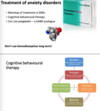Anxiety disorders Flashcards
what is the The Stress Response compose of?
- limbic system
- limbic-hypothalamo-pituitary- adrenal axis
what is the The Limbic System composed of?

where is the hippocampus? what does it do? what is it? what is its subparts

where is the Amygdala? what does it do? what is it?
an almond-shaped structure deep within the temporal lobe,
is a collection of nuclei lying beneath the uncus

effects of Prefrontal cortex & Anterior cingulate gyrus on hypothalamus?

role of hypothalamus in the stress response

role of the limbic-hypothalamo- pituitary-adrenal axis in the stress response
MAIN ACTION THROUGH CORTISOL

what is the general adaptation syndrome?
3 stages that the body goes through during prolonged exposure to stressors

So when does the stress response become a pathalogical?
the prolonged release of cortisol!
when you cannot escape a stressor(s), or when ‘trivial’ stressors elicit a strong stress response. However, patients with anxiety disorders may go through all of the stages above
Symptoms of anxiety
- Palpitations
- Sweating
- Trembling or shaking
- Dry mouth
- Difficulty breathing
- Chest pain or discomfort
- Nausea or abdominal distress (e.g. butterflies in stomach) • Feeling dizzy, unsteady, faint or light-headed
compare and contrast symtoms of thyrotoxicosis w/ anxiety?
same:
palpitations, restlessness, increased bowel movements, tremor
differences:
- no goitre
- may not have oncreased apeptite and weight loss
- thyrtoxicosis> u see vasodilation (warm & sweaty)
- Anxiety>> u see vasoconstriction (cold and clammy)
types of Anxiety disorders
(Gimme 6 types)

Treatment of anxiety disorders: (pharmacological vs non)
SSRI> selective seritonin reuptake
increases levels of seritonin at the pre-synaptic cleft
Biological
- Short term benzodiazepines
- SSRIs
pregabalin >> gaba analogue
Psychological
Cognitive behavioural therapy
o Getting patients to reflect on their feelings/thoughts/behaviours
Social
- Support groups, charities etc

why should we NOT use benzodiazepines in the long term?
- leads to intolerence
- dangerous in overdose
- addicting
define obsession
‘a thought that persists and dominates an individual’s thinking despite them knowing that it is entirely without purpose, or has persisted and dominated their thinking beyond the point of relevance or usefulness’
Examples of obsessions
Most important thing to remember… Obsessions are unpleasant

define Compulsions

Diagnostic criteria for OCD
• Obsessions/compulsions/both present on most days for a period of at least 2 weeks
• Obsessions and compulsions share all of the following features
- Originate in the mind of the patient
- Repetitive and unpleasant
- Acknowledged as excessive or unreasonable
- Patient tries to resist, but at least one obsession/compulsion is unsuccessfully resisted
- Carrying out the obsessive thought or act is not in itself pleasurable
- Obsessions/compulsions must causes distress or interfere with the
patient’s social or individual functioning
Epidemiology of OCD
- Usually begins in adolescence or early adulthood
- 33% start between 10 and 15 years old
• 75% started by age 30
- Lifetime prevalence of around 2%
- M : F 1 : 1 (but childhood OCD more common in boys)
- Lots of doctors show traits!
Pathophysiology of OCD
list suggested theories
- Re-entry circuits in basal ganglia
- Reduced serotonin
- Reduced activity in dorsolateral prefrontal cortex
- Reduced activity in orbitofrontal cortex
- Increased activity in cingulate cortex
- PANDAS
Re-entry circuits in basal ganglia

Tourette’s syndrome
is a condition that causes a person to make involuntary sounds and movements called tics.
Tics are fast, repetitive muscle movements that result in sudden and difficult to control body jolts or sounds.

what r PANDAS
Paediatric Autoimmune Neuropsychiatric Disorder Associated with Streptococcal Infection
- Sudden onset of OCD symptoms or tics after infection with Group-A beta-haemolytic strep. usually 3-12 yrs
- Usually dramatic onset of psychiatric or behavioural problems
- Antibodies ‘cross-react’ with neurons in basal ganglia, causing symptoms
- responds to treatment w/ antibiotics and usual OCD managment

Treatment of OCD therapies vs drugs
CBT> it only provides short term releif, ur gunna end up going back in the circle
high dose SSRI> may need to wait 3 months to see the response
we dont use Clomipramine first line>> bc it has unpleasant SE
-deep brain stimulation
Biological
SSRIs +/- antipsychotics
Deep brain stimulation?
Psychological
CBT and variety of other interventions
Social
Family support
Groups etc.







